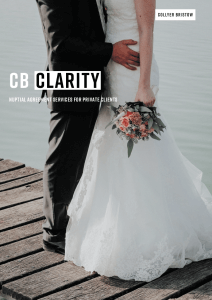
The Team
Our lawyers have the expertise and experience to provide you with creative, personalised solutions in a clear and understandable way.
Find out where you stand
Answer questions online and receive free, instant and personalised information about your situation.
Learn more about pre and post nups
In this short video Head of Family law at Collyer Bristow, Toby Yerburgh, provides a detailed guide on everything you need to know ahead of completing a pre nup or post nup.
About
What is a prenuptial agreement?
A prenuptial agreement or ‘prenup’ is a legal document drawn up between two people before they get married. It sets out the division of assets, property, income and debts in the event of a breakdown of the marriage.
What is a postnuptial agreement?
A postnup is a contract entered into after marriage or civil partnership, outlining the financial terms of a separation or divorce. It can cover any number of areas depending on what the couple agrees to include, such as property ownership and division, inheritance rights, spousal support payments, debt responsibilities and asset division.
What is the difference between a pre and post nuptial agreement?
A prenuptial agreement is put in place before you get married or form a civil partnership and a postnuptial agreement is established after.
Why should I consider getting a pre or post nup?
Nuptial agreements are put in place to provide security, clarity and certainty in the future for both parties. You may be looking to safeguard inheritance or future inheritance, own a business you would like to retain control over, or want to ensure certain assets go to children from a previous relationship. If you are considering entering into either kind of nuptial agreement, we advise you to seek guidance from one of our specialist Family lawyers.
Should I use the same lawyer as my partner for the nuptial agreement?
No, it is strongly recommended that you receive your own legal advice from an independent solicitor to ensure that the advice you are provided with is in your best interest. This also avoids any claims of conflict of interest.
What assets are included in a nuptial agreement?
The most common assets included in a UK nuptial agreement are savings, pensions, income, property, businesses, shares, and inheritance. The agreements can also be used to ringfence any expected future income, for example if one of you has started a business which you expect to be highly valued after a number of years. It is crucial that there is full financial disclosure from both parties when the agreement is initially discussed.
How long does a prenuptial agreement last?
A prenuptial agreement will last for the duration of your marriage or civil partnership. If you are unhappy with any aspect of the agreement as your partnership progresses, it is important that you seek early legal advice. If you have reached a point at which you are thinking about separation or divorce, consulting with a family lawyer early will help provide you with clarity around the next steps.
Will a nuptial agreement protect my inheritance?
Alongside protecting your current assets, a nuptial agreement will help protect any assets you are likely to receive in the future, for example if you are going to inherit a family home or business. If you are looking to protect inheritance for your future children, our Family lawyers can work collaboratively with our Trusts, tax & estate planning team to ensure that trusts are set up in their name.
If I have a prenup, do I need to review it once we are married or in a civil partnership?
A prenuptial agreement needs to be understood and agreed by both parties before the marriage or civil partnership takes place. If there have been significant changes in your life and you want to review your assets and spousal ownership, you should consider entering into a postnuptial agreement.
At what point in my marriage or civil partnership should I consider getting a postnuptial agreement?
There is often negativity in the press around postnuptial agreements being solely for couples experiencing difficulties in their marriage. This is most certainly not always the case. Many couples who have decided to get a postnup have had a change in circumstances and therefore decided to review their financial affairs with the support of a lawyer.
I am relocating to the UK. Shall I consider a postnuptial agreement to make sure my assets are protected?
If you are moving to the UK and want to ensure your assets are safeguarded should you end up filing for divorce in England or Wales, we would recommend considering a postnuptial agreement. Depending on which jurisdiction the marriage or civil partnership took place in, a divorce in England may be more advantageous for you. Additionally, if you already have a prenuptial agreement in place from the country in which you were married, it may not be legally binding in England and Wales.
How much will a nuptial agreement cost?
As part of our CB Clarity Nuptial Service, we offer an initial introductory meeting for £500 + VAT. There will then be further legal costs which can be discussed as part of this initial consultation.
Answer questions online and receive free, instant and personalised information about your situation.
Quick glance: publications
Nuptial agreements FAQs Publications
CB Clarity:prenups & postnups - prenups & postnups
Learn more about the CB Clarity prenuptial and postnuptial agreement process, the benefits of having a nuptial agreement in place, and how to arrange an initial consultation.
Nuptial agreements FAQs insights
Podcasts
The Role of Financial Coaching in Family Disputes with Kristin CunliffeThe Role of Financial Coaching in Family Disputes with Kristin Cunliffe
Listen now
Podcasts
Common Law Marriage: What Cohabiting Couples Need to KnowCommon Law Marriage: What Cohabiting Couples Need to Know
Listen now
Podcasts
Episode 1: Introducing LawTorn – Exploring Family and Inheritance DisputesEpisode 1: Introducing LawTorn – Exploring Family and Inheritance Disputes
Listen now
News
Collyer Bristow Recognised in Chambers High Net Worth 2025 GuideCollyer Bristow Recognised in Chambers High Net Worth 2025 Guide
Read more
News
Collyer Bristow Celebrates Leading Lawyers Featured in Citywealth Leaders List 2025Collyer Bristow Celebrates Leading Lawyers Featured in Citywealth Leaders List 2025
Read more
Shorter Reads
Standish v Standish: Supreme Court to Revisit the Status of Non-Matrimonial Assets on DivorceStandish v Standish: Supreme Court to Revisit the Status of Non-Matrimonial Assets on Divorce
Read more
Shorter Reads
Family Court Statistics – A True Reflection?Family Court Statistics – A True Reflection?
Read more
Shorter Reads
No-Fault Divorce – The VerdictNo-Fault Divorce – The Verdict
Read more
News
Collyer Bristow welcomes leading Family lawyer, Charmaine HastCollyer Bristow welcomes leading Family lawyer, Charmaine Hast
Read more
Shorter Reads
What is a Reconciliation Agreement?What is a Reconciliation Agreement?
Read more
Videos
What is a nuptial agreement? A full guide to everything you need to know about pre and post nupsWhat is a nuptial agreement? A full guide to everything you need to know about pre and post nups
Watch now
Longer Reads
Don’t Mention the Law: 2024 election manifestos and the absence of funding for the Courts & Legal AidDon’t Mention the Law: 2024 election manifestos and the absence of funding for the Courts & Legal Aid
Read more
You might also like
Need some more information? Make an enquiry below
Nuptial agreements FAQs key contacts
- Toby
YerburghPartner - Head of Family Law
Talk to Toby about Family & divorce
Nuptial agreements FAQs
Nuptial agreements are put in place to provide security, clarity and certainty in the future for both parties. You may be looking to safeguard inheritance or future inheritance, own a business you would like to retain control over, or want to ensure certain assets go to children from a previous relationship. If you are considering entering into either kind of nuptial agreement, we advise you to seek guidance from one of our specialist Family lawyers.
The Team
Our lawyers have the expertise and experience to provide you with creative, personalised solutions in a clear and understandable way.
Find out where you stand
Answer questions online and receive free, instant and personalised information about your situation.
Learn more about pre and post nups
In this short video Head of Family law at Collyer Bristow, Toby Yerburgh, provides a detailed guide on everything you need to know ahead of completing a pre nup or post nup.
What is a prenuptial agreement?
A prenuptial agreement or ‘prenup’ is a legal document drawn up between two people before they get married. It sets out the division of assets, property, income and debts in the event of a breakdown of the marriage.
What is a postnuptial agreement?
A postnup is a contract entered into after marriage or civil partnership, outlining the financial terms of a separation or divorce. It can cover any number of areas depending on what the couple agrees to include, such as property ownership and division, inheritance rights, spousal support payments, debt responsibilities and asset division.
What is the difference between a pre and post nuptial agreement?
A prenuptial agreement is put in place before you get married or form a civil partnership and a postnuptial agreement is established after.
Why should I consider getting a pre or post nup?
Nuptial agreements are put in place to provide security, clarity and certainty in the future for both parties. You may be looking to safeguard inheritance or future inheritance, own a business you would like to retain control over, or want to ensure certain assets go to children from a previous relationship. If you are considering entering into either kind of nuptial agreement, we advise you to seek guidance from one of our specialist Family lawyers.
Should I use the same lawyer as my partner for the nuptial agreement?
No, it is strongly recommended that you receive your own legal advice from an independent solicitor to ensure that the advice you are provided with is in your best interest. This also avoids any claims of conflict of interest.
What assets are included in a nuptial agreement?
The most common assets included in a UK nuptial agreement are savings, pensions, income, property, businesses, shares, and inheritance. The agreements can also be used to ringfence any expected future income, for example if one of you has started a business which you expect to be highly valued after a number of years. It is crucial that there is full financial disclosure from both parties when the agreement is initially discussed.
How long does a prenuptial agreement last?
A prenuptial agreement will last for the duration of your marriage or civil partnership. If you are unhappy with any aspect of the agreement as your partnership progresses, it is important that you seek early legal advice. If you have reached a point at which you are thinking about separation or divorce, consulting with a family lawyer early will help provide you with clarity around the next steps.
Will a nuptial agreement protect my inheritance?
Alongside protecting your current assets, a nuptial agreement will help protect any assets you are likely to receive in the future, for example if you are going to inherit a family home or business. If you are looking to protect inheritance for your future children, our Family lawyers can work collaboratively with our Trusts, tax & estate planning team to ensure that trusts are set up in their name.
If I have a prenup, do I need to review it once we are married or in a civil partnership?
A prenuptial agreement needs to be understood and agreed by both parties before the marriage or civil partnership takes place. If there have been significant changes in your life and you want to review your assets and spousal ownership, you should consider entering into a postnuptial agreement.
At what point in my marriage or civil partnership should I consider getting a postnuptial agreement?
There is often negativity in the press around postnuptial agreements being solely for couples experiencing difficulties in their marriage. This is most certainly not always the case. Many couples who have decided to get a postnup have had a change in circumstances and therefore decided to review their financial affairs with the support of a lawyer.
I am relocating to the UK. Shall I consider a postnuptial agreement to make sure my assets are protected?
If you are moving to the UK and want to ensure your assets are safeguarded should you end up filing for divorce in England or Wales, we would recommend considering a postnuptial agreement. Depending on which jurisdiction the marriage or civil partnership took place in, a divorce in England may be more advantageous for you. Additionally, if you already have a prenuptial agreement in place from the country in which you were married, it may not be legally binding in England and Wales.
How much will a nuptial agreement cost?
As part of our CB Clarity Nuptial Service, we offer an initial introductory meeting for £500 + VAT. There will then be further legal costs which can be discussed as part of this initial consultation.
Toby YerburghPartner - Head of Family Law
View Toby Yerburgh's profileBuffy Wood (née Meyrick)Associate
View Buffy Wood (née Meyrick)'s profileCharmaine HastConsultant
View Charmaine Hast's profileChristina PippasAssociate
View Christina Pippas's profileColette DooleyChartered Legal Executive
View Colette Dooley's profileDebbie MarinAssociate
View Debbie Marin's profileLaura Burrows (née Plumbly)Associate
View Laura Burrows (née Plumbly)'s profileMichael DrakeConsultant
View Michael Drake's profileOlivia BarrettAssociate
View Olivia Barrett's profilePhilippa DolanPartner
View Philippa Dolan's profileTanya RobertsPartner
View Tanya Roberts's profileAnswer questions online and receive free, instant and personalised information about your situation.
Nuptial agreements FAQs Publications
Nuptial agreements FAQs insights
Podcasts
The Role of Financial Coaching in Family Disputes with Kristin CunliffeThe Role of Financial Coaching in Family Disputes with Kristin Cunliffe
Listen now
Podcasts
Common Law Marriage: What Cohabiting Couples Need to KnowCommon Law Marriage: What Cohabiting Couples Need to Know
Listen now
Podcasts
Episode 1: Introducing LawTorn – Exploring Family and Inheritance DisputesEpisode 1: Introducing LawTorn – Exploring Family and Inheritance Disputes
Listen now
News
Collyer Bristow Recognised in Chambers High Net Worth 2025 GuideCollyer Bristow Recognised in Chambers High Net Worth 2025 Guide
Read more
News
Collyer Bristow Celebrates Leading Lawyers Featured in Citywealth Leaders List 2025Collyer Bristow Celebrates Leading Lawyers Featured in Citywealth Leaders List 2025
Read more
Shorter Reads
Standish v Standish: Supreme Court to Revisit the Status of Non-Matrimonial Assets on DivorceStandish v Standish: Supreme Court to Revisit the Status of Non-Matrimonial Assets on Divorce
Read more
Shorter Reads
Family Court Statistics – A True Reflection?Family Court Statistics – A True Reflection?
Read more
Shorter Reads
No-Fault Divorce – The VerdictNo-Fault Divorce – The Verdict
Read more
News
Collyer Bristow welcomes leading Family lawyer, Charmaine HastCollyer Bristow welcomes leading Family lawyer, Charmaine Hast
Read more
Shorter Reads
What is a Reconciliation Agreement?What is a Reconciliation Agreement?
Read more
Videos
What is a nuptial agreement? A full guide to everything you need to know about pre and post nupsWhat is a nuptial agreement? A full guide to everything you need to know about pre and post nups
Watch now
Longer Reads
Don’t Mention the Law: 2024 election manifestos and the absence of funding for the Courts & Legal AidDon’t Mention the Law: 2024 election manifestos and the absence of funding for the Courts & Legal Aid
Read more
Need some more information? Make an enquiry below.
Message us on WhatsApp (calling not available)
Please note that Collyer Bristow provides this service during office hours for general information and enquiries only and that no legal or other professional advice will be provided over the WhatsApp platform. Please also note that if you choose to use this platform your personal data is likely to be processed outside the UK and EEA, including in the US. Appropriate legal or other professional opinion should be taken before taking or omitting to take any action in respect of any specific problem. Collyer Bristow LLP accepts no liability for any loss or damage which may arise from reliance on information provided. All information will be deleted immediately upon completion of a conversation.
Close

























